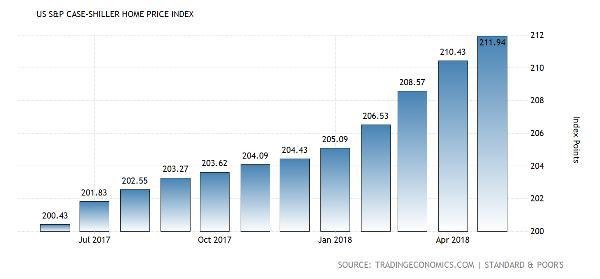We all heard of the "wealth effect". This is a policy that was pursued by the governments and central banks for the last few decades. The idea is to keep interest rates low which push assets such as real estate or the stock market higher so that people feel "wealthier".
The idea behind this is that when people see their investment accounts growing, they are more apt to spend. This is enhanced when that situation is coupled with debt via using the home as an ATM.
Over the last decade, central banks put this policy on steroids by adding liquidity to the system with all the quantative easing. This helped to again push other assets higher giving many reason to believe we are seeing the "bubble of everything".
For those who are owning these assets, the ride up is a fun one. There is no doubt the policy was effective, at least in driving values up. The U.S. equities markets are at all-time highs. At the same time, real estate is nearing the 8th year of this bull run. Even after all the rate increase by the Fed, mortgage rates are still near all time lows.

This appears to impacted the economy. The U.S. unemployment rate is near a 50 year low. The economy is growing at a satisfactory rate. Even inflation, something the Fed could not find for most of the last 10 years, is around their mandate of 2%.
All appears rosy.
Unfortunately, when it comes to markets, we know things do not stay the same for long. All bull runs come to an end. This is a natural part of the cycle when things get too heated. The scary thing is that when things pop, it can cause a lot of pain.
In this situation, effectively there is the reversing of the wealth effect. All the gains from the past 10 years can unwind quickly. We saw this in the 2008-2009 financial meltdown.
Many are watching the real estate market. This is such a large part of the economy that if it reverses, the tentacles reach almost every sector of society. The job situation is immediately affected meaning that personal income statements are put in jeopardy. This tends to be compounded by the fact that the average family is carrying more debt than they can reasonably afford. One hiccup and defaults start.
Real estate is a leverage asset in the vast majority of cases. This means that the ride up increases the wealth effect. With so little money on the line, all growth in value is profit. However, reverse this scenario and profits dry up quickly. If one is smart, this might not be a problem since the run up along with payments made could give one the margin of safety that is needed. As was stated, many like to use the home as an ATM which eliminates that safety net. This is where the wealth effect becomes the "buried under debt" effect.
The party is fun while the music is playing. When the music stops, however, that is when the pain can start.
Where will markets go next is the question on everyone's mind. Will the wealth effect continue or are we about to see a reversal?
Further reading on this subject along with the photo credit here.
